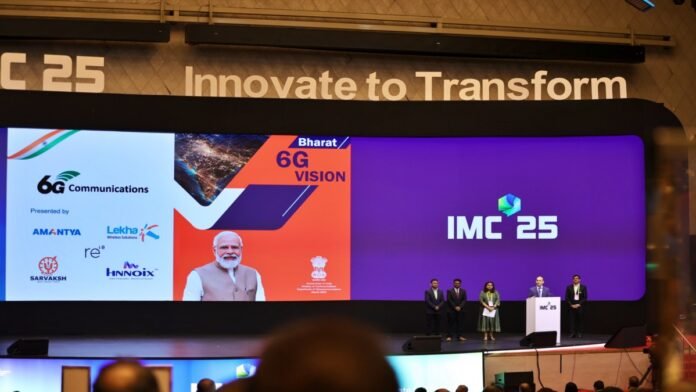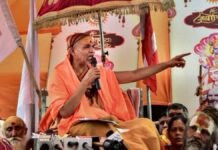
Key Points
- PM Narendra Modi inaugurated 9th edition of India Mobile Congress (IMC) 2025 at 9:45 AM on October 8, 2025, at Yashobhoomi International Convention Centre, New Delhi
- Four-day mega event runs October 8-11, 2025, under theme “Innovate to Transform” showcasing India’s digital sovereignty and tech leadership
- Over 1.5 lakh visitors from 150+ countries, 7,000+ global delegates, 800+ speakers, and 400+ exhibitors participating
- Six major global summits: International Bharat 6G Symposium, AI Summit, Cybersecurity Summit, Satcom Summit, Quantum Summit, and Networks
- Over 1,600 new use-cases across 5G/6G, AI, smart mobility, cybersecurity, quantum computing, and green technology showcased through 100+ sessions
- IMC Aspire Program debuts with 500+ startups meeting 300+ investors as financing aggregator platform
- Three SATCOM licenses issued by government; special summit focuses on satellite-based communications for rural connectivity
- International delegations from Japan, Canada, UK, Russia, Ireland, and Austria strengthen India’s global technology network
- PM Modi highlighted India’s transformation from 2G challenges to 5G reaching nearly every district as testament to Aatmanirbhar Bharat
- Event organized jointly by Department of Telecommunications (DoT) and Cellular Operators Association of India (COAI)
New Delhi: Prime Minister Narendra Modi inaugurated the 9th edition of the India Mobile Congress (IMC) 2025, Asia’s largest telecommunications, media, and technology platform, at 9:45 AM today at the Yashobhoomi International Convention Centre in Dwarka, New Delhi. The four-day mega event, running from October 8-11, 2025, promises to be a landmark gathering that showcases India’s rapidly advancing digital capabilities and positions the nation as a global leader in next-generation technologies.
PM Modi Highlights India’s Digital Transformation Journey
During his inaugural address at the Yashobhoomi Convention Centre, Prime Minister Modi emphasized India’s remarkable progress in the telecommunications sector, describing it as a testament to the strength of the Aatmanirbhar Bharat (self-reliant India) vision. He recalled that India, which once faced significant challenges with 2G connectivity, has now successfully expanded 5G networks to nearly every district across the nation.
“IMC events are no longer limited to just mobile or telecom. In just a few years, this IMC event has become Asia’s largest digital technology forum,” PM Modi stated. He attributed this transformation to India’s innovative mindset, talented youth, skilled workforce, innovators, and startups, adding, “This has been possible because today the government stands firmly behind the country’s talent and capabilities”.
The Prime Minister’s remarks underscored how innovation, self-reliance, and technology are collectively driving India’s digital revolution, enabling faster connectivity and modern infrastructure nationwide. The growth of India Mobile Congress itself mirrors the country’s broader achievements in telecommunications and digital transformation.
“Innovate to Transform”: The Guiding Theme
IMC 2025 operates under the powerful theme “Innovate to Transform,” which highlights India’s commitment to leveraging innovation for digital transformation and societal progress. This theme encapsulates the event’s core mission: demonstrating how technological innovation can drive economic development, enhance quality of life, and establish India as a global technology powerhouse.
The theme reflects India’s strategic priorities in next-generation connectivity, digital sovereignty, cyber fraud prevention, and global technology leadership—all critical pillars for the nation’s digital future. By bringing together global leaders, policymakers, industry experts, and innovators under this unified vision, IMC 2025 aims to foster collaboration that translates innovative ideas into tangible transformations across society and economy.
Unprecedented Scale and Global Participation
The scale of IMC 2025 is truly staggering, establishing it as one of the most significant technology events in Asia and globally. This year’s edition expects to attract more than 1.5 lakh (150,000) visitors from over 150 countries, creating an unparalleled networking and knowledge-exchange environment.
The event brings together over 7,000 global delegates representing governments, corporations, research institutions, and technology organizations worldwide. More than 400 companies—ranging from telecom giants and technology corporations to innovative startups—are exhibiting their latest products, services, and solutions.
The conference component features over 800 speakers delivering insights across more than 100 sessions, covering every aspect of telecommunications, digital technology, and emerging innovations. This comprehensive programming ensures that attendees gain exposure to diverse perspectives and cutting-edge developments shaping the global technology landscape.
Six Major Global Summits Define the Agenda
IMC 2025 features six major global summits, each representing frontiers of digital innovation and addressing critical technology domains. These summits serve as dedicated forums for deep-dive discussions, policy dialogues, and showcasing breakthrough advancements.
International Bharat 6G Symposium
The International Bharat 6G Symposium takes center stage, showcasing India’s leadership in 6G research and development through the Bharat 6G Alliance. As nations worldwide race to define 6G standards and technologies, India is positioning itself as a key player in shaping this next telecommunications revolution. The symposium will explore India’s indigenous 6G capabilities, research progress, standardization efforts, and collaborative opportunities with international partners.
AI Summit
The AI Summit addresses artificial intelligence applications across telecommunications, governance, healthcare, agriculture, education, and industry. With AI increasingly recognized as foundational to India’s digital future, this summit explores responsible AI deployment, regulatory frameworks, ethical considerations, and breakthrough innovations. Union Minister Jyotiraditya Scindia emphasized the importance of promoting responsible AI that balances innovation with safety and ethical considerations.
Cybersecurity Summit
Given the critical importance of protecting data and systems in an increasingly connected world, the Cybersecurity Summit focuses on threat detection, prevention strategies, secure infrastructure, and policy frameworks. Minister Scindia stressed, “Providing telecom services is as important as protecting the data and security of 1.2 billion users,” highlighting the government’s commitment to comprehensive cyber protection.
SATCOM Summit
The SATCOM (Satellite Communications) Summit represents a breakthrough focus area for IMC 2025. Union Minister Jyotiraditya Scindia announced that the government has issued three SATCOM licenses to date, marking significant progress in this emerging connectivity domain. The summit will host special discussions on bringing satellite-based communications to the general public, with particular emphasis on increasing connectivity in rural and remote areas where traditional terrestrial networks face deployment challenges. This initiative promises to be a milestone in bridging India’s digital divide and ensuring universal connectivity.
Quantum Summit
The Quantum Summit explores quantum communications and quantum computing—technologies that promise to revolutionize encryption, computational power, and secure communications. India’s investments in quantum research and the global race for quantum supremacy make this summit particularly significant for understanding future technological landscapes.
Networks Summit
The Networks Summit addresses optical communications, semiconductors in telecom, network architecture, and next-generation infrastructure that will power India’s digital economy. Topics include optical networks, network virtualization, Open RAN (Radio Access Network) technologies, and the semiconductor supply chain critical for telecommunications equipment.
Focus on Next-Generation Technologies
IMC 2025 showcases over 1,600 new use-cases demonstrating practical applications of emerging technologies. These use-cases span multiple critical domains:
5G and 6G Technologies: Real-world implementations of 5G across industries, plus exploratory 6G demonstrations that preview the next generation of ultra-fast, low-latency connectivity.
Artificial Intelligence and Machine Learning: AI applications in network optimization, predictive maintenance, customer service, content personalization, and autonomous systems.
Smart Mobility: Connected vehicles, autonomous transportation, intelligent traffic management, and mobility-as-a-service platforms enabled by advanced connectivity.
Cybersecurity Solutions: Advanced threat detection systems, zero-trust architectures, quantum-safe encryption, and fraud prevention mechanisms protecting users and infrastructure.
Quantum Computing: Demonstrations of quantum algorithms, quantum communication protocols, and potential applications in cryptography, drug discovery, and complex optimization problems.
Green Technology: Sustainable telecom infrastructure, energy-efficient networks, circular economy approaches to electronic waste, and technologies supporting environmental goals.
Key Thematic Areas and Tracks
The event is structured around four core pillars that organize discussions and exhibitions :
Quest for Innovation
This track explores 5G/6G technologies, autonomous networks, OpenAPI frameworks, cybersecurity architectures, quantum computing applications, and cloud/data center infrastructure. It focuses on technological breakthroughs that push the boundaries of what’s possible in connectivity and computing.
Game Changers
This pillar highlights transformative technologies including AI/ML applications, satellite connectivity solutions, smart mobility ecosystems, digital public infrastructure, and Environmental, Social, and Governance (ESG) considerations in technology deployment. These are technologies and approaches that fundamentally alter how societies function and businesses operate.
Crossroads of Policy and Technology
This track addresses critical policy matters including semiconductor manufacturing, spectrum regulation, electronics manufacturing ecosystems, broadcasting policy, and skill development initiatives. It recognizes that technology advancement requires supportive policy frameworks and addresses the intersection of innovation and governance.
Aspire to Lead
This entrepreneurial track focuses on how startups and innovators can scale, access funding, connect with investors, and find market opportunities. It emphasizes India’s vibrant startup ecosystem and the pathways for emerging companies to achieve leadership positions.
Game-Changing IMC Aspire Program Debuts
For the first time in IMC history, the event features the IMC Aspire Program, a dedicated initiative designed to catalyze India’s startup ecosystem. This groundbreaking program brings together over 500 startups with more than 300 investors, functioning as a comprehensive financing aggregator platform.
The Aspire Program facilitates direct communication between innovators and investors, eliminating intermediaries and accelerating the funding process for promising technology ventures. This initiative could prove to be a game-changer for India’s startup ecosystem, providing emerging companies with unprecedented access to capital, mentorship, and market connections.
Running from October 8-10, 2025, the Aspire Program includes pitch sessions, investor meetings, mentorship workshops, and networking events specifically designed to connect entrepreneurs with the resources they need to scale. The program also features the Startup World Cup India competition, showcasing the most innovative startups and awarding prizes to winners.
By creating this dedicated platform within Asia’s largest technology event, IMC 2025 ensures that startups receive visibility among global delegates, potential customers, and strategic partners—opportunities that can transform emerging companies into industry leaders.
International Collaboration and Global Partnerships
IMC 2025 underscores international collaboration as a cornerstone of India’s technology strategy. Delegations from numerous countries are participating, with notable representation from Japan, Canada, the United Kingdom, Russia, Ireland, and Austria.
These international partnerships serve multiple strategic purposes. They facilitate technology transfer and knowledge sharing, enabling India to learn from global best practices while showcasing indigenous innovations. They create opportunities for joint research and development initiatives in areas like 6G, quantum technologies, and AI. They also open market access for Indian technology companies seeking to expand internationally, while attracting foreign investment into India’s digital economy.
The participation of delegates from over 150 countries transforms IMC 2025 into a truly global forum where bilateral and multilateral partnerships can be forged, strengthening India’s position in the international technology community.
SATCOM Services: Bridging the Connectivity Gap
One of the most significant policy announcements at IMC 2025 relates to satellite communications. Union Minister for Communications Jyotiraditya Scindia revealed that the government has issued three SATCOM licenses to date, marking substantial progress in this emerging connectivity domain.
The SATCOM Summit at IMC 2025 features special discussions on bringing satellite-based communications to the general public, with particular focus on rural and remote areas where traditional cellular infrastructure remains economically unviable or technically challenging to deploy. Satellite communications offer the promise of universal connectivity, reaching India’s most geographically isolated populations and enabling them to participate in the digital economy.
This initiative aligns with the government’s broader goal of ensuring that digital services reach every Indian citizen, regardless of location. By combining terrestrial networks with satellite-based systems, India can achieve true universal broadband coverage—a milestone that would significantly impact education, healthcare, governance, and economic opportunity in underserved regions.
Data Security for 1.2 Billion Users
Minister Scindia emphasized that protecting user data and ensuring cybersecurity is as important as providing telecommunications services themselves. With 1.2 billion telecom users in India, the scale of potential cyber threats is enormous, making robust security frameworks absolutely critical.
The government’s cybersecurity priorities include protecting critical infrastructure, preventing cyber fraud and financial crimes, securing personal data, ensuring privacy, and building national capacity in cyber defense. IMC 2025’s dedicated Cybersecurity Summit addresses all these dimensions, bringing together global experts, ethical hackers, security researchers, and policymakers to share knowledge and develop comprehensive security strategies.
The focus on responsible AI also connects to security concerns, as AI systems must be developed and deployed with built-in safety features, transparency, and accountability mechanisms to prevent misuse or unintended harmful consequences.
Additional Special Programs and Initiatives
Beyond the major summits, IMC 2025 features several specialized programs that add depth and diversity to the event :
Open API Hackathon: Developers compete to create innovative applications using open application programming interfaces, fostering creativity and practical problem-solving.
AI for Good India: This initiative explores how artificial intelligence can be harnessed to address social challenges, improve governance, enhance healthcare and education, and drive inclusive development.
Robotics for Youth: Engaging young people in robotics and automation, this program aims to inspire the next generation of engineers, innovators, and technology entrepreneurs.
Telecom Equipment Manufacturing: Discussions and exhibitions focused on building India’s domestic capacity to manufacture telecommunications equipment, reducing import dependence and creating high-value manufacturing jobs.
Spectrum Management: Policy dialogues addressing the allocation, pricing, and regulation of radio spectrum—a critical resource for wireless communications.
Green Telecom: Initiatives promoting environmentally sustainable telecommunications infrastructure, energy-efficient networks, and circular economy approaches to electronic equipment.
Cloud and Edge Computing: Showcasing distributed computing architectures that enable low-latency applications and process data closer to end-users.
Data Centers and Hyperscalers: Addressing India’s growing digital infrastructure needs, including large-scale data centers that support cloud services and digital platforms.
Venue: Yashobhoomi International Convention Centre
IMC 2025 is hosted at Yashobhoomi, India’s largest and most modern convention and exhibition center, located in Dwarka, New Delhi. The event utilizes Hall 1, Hall 2, and the main Auditorium, providing extensive space for exhibitions, conferences, demonstrations, and networking.
Yashobhoomi features state-of-the-art infrastructure designed for world-class international events, with advanced audio-visual systems, seamless connectivity, modern facilities, and comprehensive services that ensure a premium experience for exhibitors and attendees. The venue’s strategic location in the national capital makes it accessible to both domestic and international participants.
The choice of this premier venue reflects IMC’s status as Asia’s flagship technology event and India’s commitment to hosting global gatherings that showcase the nation’s capabilities and infrastructure.
Four-Day Schedule Overview
The event follows a structured four-day schedule designed to maximize engagement and coverage of diverse topics :
Day 1 (October 8, 2025): Opening keynote by Prime Minister Modi, exhibition launch, inaugural roundtables, and initial policy sessions setting the agenda for the event.
Days 2-3 (October 9-10, 2025): Thematic tracks running simultaneously, deep-tech showcases, specialized summits, policy sessions, startup pitch events through the Aspire Program, and extensive networking opportunities.
Day 4 (October 11, 2025): Awards ceremonies recognizing excellence in innovation and technology, closing plenary sessions synthesizing key takeaways, and wrap-up symposiums.
This structure ensures that attendees can engage with content relevant to their specific interests while also providing opportunities for cross-pollination of ideas across different technology domains and industry sectors.
About India Mobile Congress
India Mobile Congress is Asia’s largest telecommunications, media, and technology (TMT) platform, jointly organized by the Department of Telecommunications (DoT) under the Ministry of Communications and the Cellular Operators Association of India (COAI). Since its inception, IMC has established itself as the premier forum for bringing together industry, government, academia, and ecosystem stakeholders to discuss and display the latest developments in technology.
IMC comprises three core components: India’s biggest technology exhibition showcasing products and innovations, an international conference featuring thought leadership and policy discussions, and extensive B2B (business-to-business) and B2G (business-to-government) networking opportunities. This multi-dimensional format makes IMC unique among technology events, offering value across multiple stakeholder categories.
The event has grown significantly since its launch, evolving from a telecommunications-focused gathering into a comprehensive digital technology forum addressing the full spectrum of technologies driving India’s digital transformation. Previous editions have been hosted in various cities including Prayagraj (2023) and Chennai (2024), reflecting the event’s commitment to showcasing India’s technology capabilities across different regions.
Registration and Participation
Registration for IMC 2025 is available through the official website (indiamobilecongress.com), with different categories for delegates, exhibitors, media representatives, and policymakers. Delegate registration is typically complimentary, while exhibitors and sponsors can customize participation packages based on their specific requirements and desired visibility.
Early registration is strongly recommended, as spaces and popular sessions fill quickly given the event’s massive scale and international appeal. The registration system allows attendees to build personalized agendas based on their interests, ensuring they can maximize value from the extensive programming available across four days.
Strategic Significance for India’s Digital Future
IMC 2025 represents far more than a technology exhibition and conference—it is a statement of India’s digital ambitions and capabilities on the global stage. The event showcases how India has transformed from a nation struggling with basic connectivity to one leading discussions on 6G, quantum communications, and AI governance.
By bringing together the global technology community in India, IMC reinforces the nation’s position as a hub for digital innovation, a market for advanced technologies, and a partner for international collaboration. The connections forged, partnerships announced, and innovations showcased at IMC 2025 will shape India’s technology trajectory for years to come.
The emphasis on indigenous technologies, self-reliance, and Make in India within telecommunications and digital sectors demonstrates India’s commitment to building domestic capabilities while remaining open to global partnerships. This balanced approach positions India to capture value from the global digital economy while building strategic autonomy in critical technology domains.
As Prime Minister Modi noted, the transformation of IMC itself from a mobile-focused event to Asia’s largest digital technology forum—mirrors India’s broader digital transformation journey. With over 1.5 lakh visitors, global delegations from 150+ countries, and comprehensive coverage of technologies shaping the future, IMC 2025 cements India’s status as a global technology powerhouse ready to innovate, transform, and lead.








































